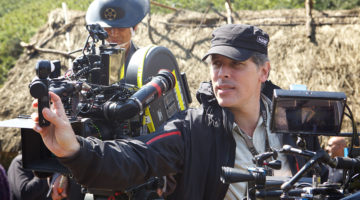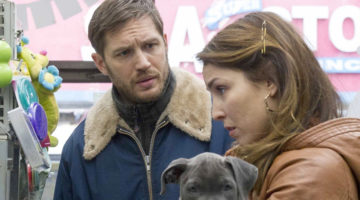Interview: Katherine Waterston talks Inherent Vice

At the center of a hazy and meandering story, the impetus for a stoner private detective to find in way into a world of corrupt cops, mysterious gangs, drug-addled doctors, and numerous other wayward souls, is one beautiful, mysterious vixen. Isn’t it always the case?
The soothing voice of a narrator begins Inherent Vice, the latest film from Paul Thomas Anderson, and she explains the past relationship between our befuddled protagonist Larry ‘Doc’ Sportello (Joaquin Phoenix) and the woman he adores, the wonderfully named Shasta Fay Hepworth
Katherine Waterston (yes, daughter of Sam) plays Shasta, the enigmatic and sultry femme fatale who may or may not be in trouble, and whose disappearance propels Doc into strange environments and even stranger conversations.
This stoner noir by Anderson is mesmerizing, grounded by a great adaption of Thomas Pynchon’s book and a superb ensemble cast, including Reese Witherspoon, Owen Wilson, Josh Brolin, Benicio del Toro, and Joanna Newsom.
Waterston visited Toronto and participated in a press roundtable, sharing her thoughts on what it’s like to work with both Anderson and Phoenix, and the ways in which she tried to maintain her magnetic aura.
“You can’t actively play mystery,” says Waterston. “It’s a tricky line to walk there. You don’t want to play “the thing,” and you don’t want to be too clear or boring. You can’t hold the cards so close to your chest and have a perfect poker face, otherwise no one will care. No one will give a damn. Who cares at that point?”
“Generally, if I don’t have to and unless I’m really lost and I can only get something from talking to another actor, I try not to talk about what’s happening in scenes too much,” said Waterston in regards to the collaborative process. There seemed to be at least a casual effort to keep Phoenix in the dark. Doc after all, is a very confused character, and Phoenix had previously said he read the book, but didn’t want to read it completely a second time for fear of letting himself know too much. So Waterson was careful working with Phoenix. “I don’t want to dilute that energy. I think you can over-talk these things, and it can take away from the moment you’re trying to capture. You’re trying to capture life in a bottle.”
“For me, with this particular character, it felt good to have secrets, so it didn’t matter if they were her secrets or my own personal secrets. Just to have the sensation of having something for myself kept me rooted and focused.”
Waterston took the lead from her director, a filmmaker she praised for his confidence, his trust, and his ability to keep many things moving at once. “There’s something witchy about what Paul does as a director. It’s like there’s a radio dial on the set, and he sets it to a certain station, and we’re all listening to the same station,” she explained.”We never talk about it, but we all feel it, and there’s something really hands-off and gentle about it, but also really focused. It felt really secure in that way. We all have our separate jobs and our private business that we’re doing, but we’re all in it together in this same world.”
Of Phoenix, an enigmatic actor in his own right and own who has a curious reputation, Waterston said: “I expected to be intimidated by him because he’s so brilliant, but he’s just so generous, and self-effacing, and playful. I kept expecting that intimidation to kick in, but it never came.”
She felt the same way with Mr. Anderson.
“What’s so amazing that he does once I realized how he works, is that he hands the parts over to his actors. With a lot of directors…They want you to do it, but there’s also a part of them that wants to do it themselves and they’re deathly afraid you’re going to fuck it up. And Paul, he’ll slip that ten dollar bill and run in the opposite direction,” she said, laughing. “It’s yours and he’s not taking it back from you. You can feel that confidence he has in his actors. That’s so empowering. You know he’s brilliant, but he’s putting his faith in you, and that’s such a wild feeling to have. But it’s also really encouraging.”
For her biggest role yet, starring a film among accomplished actors and one very talented director, as well as working on a pivotal lengthy uncut scene, Waterston seemed completely at home.” I felt a very strong responsibility to getting Shasta right in every scene where I was in the movie. She wasn’t afraid as a character, so I wasn’t afraid, and that’s the luxury of playing a part where someone’s confident. You get to take on the energy of that character and you don’t have to worry about your own neurotic self for a while. It’s kind of its own nice, working vacation.”




